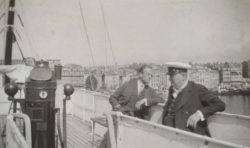Winston Churchill was better placed than most to survey the grand scale of destruction wreaked by the Second World War. But amidst this widespread devastation, Churchill himself suffered personal tragedy.
In particular, the assassination of the former Secretary of State for the Colonies Walter Edward Guinness, 1st Baron Moyne, in Cairo on 6 November 1944 by two members of the militant Zionist group Lehi had a profound psychological impact on Churchill.
Lord Moyne was a close friend of Winston Churchill. During the summer of 1934, at the height of his ‘wilderness years’, Churchill had sought refuge in the company of Moyne on the latter’s yacht Rosaura in the Mediterranean Sea. Moyne and Churchill had earlier been political allies as minority opposition on issues including Hitler’s rise to power and German rearmament. [Wilson, D., Dark and Light: The Story of the Guinness Family (1998), p.296].
Unsurprisingly, therefore, Churchill’s personal reaction to Moyne’s death was passionate. In private, Churchill denounced the killing as ‘an odious act of ingratitude’. [Quoted., Johnson, B., The Churchill Factor (2015), p.330.] A private letter to Moyne’s son, hand-written by Churchill on 17 November 1944, lamented the loss of ‘a great friend of mine in public and private’ and ‘a great and wise servant’ characterised by ‘ripe wisdom and vigorous intellect’. [CAC: CHAR 20/138b/165, letter from Churchill to Lord Moyne, 17 November 1944.]
In public, Churchill’s comment on the matter was similarly emotional. In an address to the House of Commons on 17 November 1944, Churchill suggested that ‘the smoke of assassins’ pistols’ would force a reconsideration of the position towards Jewish affairs that he had ‘maintained so consistently and so long in the past. [Commons Debates, Volume 404, COL. 2242, 17 November 1944.]

Moyne and Churchill aboard Rosaura, summer 1934. Image from: National Portrait Gallery (NPG): Moyne collection, NPG Ax138139.
It is difficult to be certain whether Moyne’s death had any tangible impact on Churchill’s political policy, especially in relation to the Nazi persecution of Jews. Yet, analysis the changes of tone of Churchill’s correspondences proves insightful in signifying a shift in his attitude towards Jewish affairs.
Following Moyne’s death, Churchill’s language in relation to such matters became noticeably frostier. In late November 1944, Churchill simply scribbled ‘no message’ on an aide’s request for a 70th birthday message to Jewish leader Chaim Weizmann. [TNA: PRO PREM 4/52/3, internal correspondence in office of Churchill, 27 November 1944.]
Even by January 1945, Churchill – in response to Eden’s appeal for a personal message to Weizmann expressing regret at the reports of genocide emerging from Eastern Europe – instructed his Foreign Secretary curtly to ‘do so yourself’. [TNA: PRO PREM 4/52/3, private correspondence between Churchill and Eden, 18 January 1945.]
Again, although reliant on speculation, it could be argued that Churchill was aggrieved by the lack of personal messages from Jewish figures of sympathy regarding Moyne’s death – in contrast to the telegrams of condolence he received from both the King Iman Yahya of Yemen and Prime Minister Hamdi al Pachachi of Iraq offering ‘heartful sympathy’ at the ‘sorrowful’ episode. [CAC: CHAR 20/144B/176, telegrams between Churchill, King Yahya and al Pachachi, 16 November 1944.]
Either way, Moyne’s assassination did not necessarily aide the cause of European Jews in the consideration of their persecution by the Prime Minister. Although apparently too preoccupied with other war objectives to address the Holocaust in satisfactory terms, Churchill still – during January and February 1945 – found time to send a series of personal encrypts to Lord Killearn, British Ambassador to Egypt, urging the ‘importance that both assassins be executed’. [CAC: CHAR 20/223/23, telegram from Churchill to Lord Killearn, 12 February 1945.]
Churchill further warned Killearn against the risk of the ‘gross interference with the course of justice’ posed by the ‘pressure from Zionist and American Jewry’ to afford clemency to Moyne’s murderers (Eliyahu Bet-Zuri and Eliyahu Hakim) before the assassins’ eventual hanging in March 1945. [CAC: CHAR 20/138B/165, telegram from Churchill to Lord Killearn, 17 November 1944.]
In a letter of 15 November 1944 addressed to Churchill’s private secretary John Martin, the Jewish social and political theorist Isaiah Berlin, outlined the ‘dread’ felt by Weizmann – described as being in ‘an awful state’ – about the impact which Moyne’s death might have on Churchill’s sympathies to a variety of Jewish causes, including that of the rescue of persecuted European Jews. [CAC: CHAR 20/139B/102, letter from Isaiah Berlin to John Martin, 15 November 1944.]
The Moyne episode provides a poignant reminder that Churchill too was personally affected by wartime loss of close friends. From a historical perspective, archival evidence also provokes an intriguing wider question: to what extent do leaders allow their personal attitudes to shape broader policy?
About the author
Daniel Adamson is a PhD student in the History Department of Durham University. His current research centres on British Holocaust education. Daniel holds degrees from the University of Cambridge, the University of Buckingham, and University College London (UCL).

Daniel Adamson.
The views expressed are the views of the writer alone, and are not endorsed or otherwise by Churchill College in any way whatsoever.
Subscribe to Churchill Archives Centre News
Subscribe to the Churchill Archives News RSS feed:
